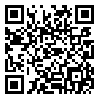Volume 9, Issue 2 (2021)
CLRJ 2021, 9(2): 88-112 |
Back to browse issues page
Download citation:
BibTeX | RIS | EndNote | Medlars | ProCite | Reference Manager | RefWorks
Send citation to:



BibTeX | RIS | EndNote | Medlars | ProCite | Reference Manager | RefWorks
Send citation to:
Sajjadi S Y, Sajjadi M. A comparative study of absurdity and objectification In stranger by Albert camus and Bouf-e-koor by Sadegh Hedayat. CLRJ 2021; 9 (2) :88-112
URL: http://clrj.modares.ac.ir/article-12-51356-en.html
URL: http://clrj.modares.ac.ir/article-12-51356-en.html
1- Tarbiat Modares University , yasminsajadi@ymail.com
2- Department of English language, Abadeh branch, Islamic Azad University, Abadeh, Iran
2- Department of English language, Abadeh branch, Islamic Azad University, Abadeh, Iran
Abstract: (2402 Views)
Absurdity is an important concept that has been proposed in the works of many modern scholars. Albert Camus is one of the authors who has paid attention to this concept in his works and has dealt with many other concepts such as rebellion, repetition, and death. The Stranger is one of the main works of Albert Camus in which the concept of absurdity in the heart of modern life is considered. On the other hand, there is a concept called objectification that has important and fundamental differences from the concept of absurdity. In this study, the concept of absurdity and objectification is considered comparatively in Stranger by Albert Camus and Bouf-e-koor by Sadegh Hedayat. In this study, we finally conclude that although Sadegh Hedayat's novel the Bouf-e-koor is remarkably considered as an absurdist work in Iran, it can be further analyzed as a work in the state of objectification. Albert Camus' Stranger, however, can be considered a perfect example of an absurdist work. Readers and even critics often seem to misunderstand the concept of absurdity and objectification. As much as absurdity is a positive concept with active action and clear insight in dialogue with other works and thoughts, objectification is radical, negative, and lacks clear insight and interaction with other thoughts and topics.
Article Type: Original Research |
Subject:
The Relationship of Persian Language and Literature with the Language and Literature of European Nations (Impact, Effect and Similarity)
Received: 2021/04/4 | Accepted: 2021/07/18 | Published: 2021/09/1
Received: 2021/04/4 | Accepted: 2021/07/18 | Published: 2021/09/1
Send email to the article author
| Rights and permissions | |
 |
This work is licensed under a Creative Commons Attribution-NonCommercial 4.0 International License. |








